- Home
- Clive Barker
Infernal Parade Page 2
Infernal Parade Read online
Page 2
“Very impressive,” Tom said. “You’re going to be the hit of our show.”
“I’d better be,” she said, only half-joking. “It’s taken me a long time to get these tricks right. I want them appreciated.”
“Oh, you’ll be appreciated,” Tom said. “You’ll be worshipped and loved. If only by me.”
“Ha! You can take your love, Tom Requiem, and drown it. But your worship? That I’ll take. At least until you get on the wrong side of me.”
“What then?”
“What do you think, what then?” Mary Slaughter replied. “I will cut you up into so many tiny, tiny pieces that your own mother wouldn’t be able to find a fragment she recognized.”
And offering a little smile to sweeten the threat, she closed up her casket, saying a fond goodnight to her swords as she did so.
“When should we hit the road?” Tom said.
“First thing tomorrow morning suits me. It’s a Godless world up there. The sooner they see a glimpse of the Infernal Parade, the sooner we can get them back in the pews, praying for the sanctity of their souls.” She laughed at this. “If only they knew,” she said, “how little that meant…”
LUIS HEARD HIS father’s voice barking at him, but he didn’t turn back to obey his instructions. Instead he continued to walk, away from the tenements and out towards the old furnaces. They’d been cold for years now, since Luis was just a small boy. But the mountains of grey ash that the furnaces had produced during their many years of their relentless roaring life still covered the ground all around them.
It tainted everything within a hundred square miles. It blew into the tenements, and got into the food people ate there: into their eyes too, and their beds. It made their shit grey, and their skins grey and the whites of their eyes grey.
Luis hated the ash. But not as much as he hated his family. Them he hated with as much fury as his heart could muster. His father and mother, his two sisters and his older brother, they were his enemies.
“I wish they were dead, I wish they were dead…” he said to himself as he trudged towards the furnaces. With every step a cloud of grey dust erupted around his feet. It would get worse the closer to the furnaces he ventured, he knew. But he didn’t care. The more distance he put between himself and his family the happier he’d be.
Night was falling. It was getting cold. So he was pleased to see a bonfire burning in the gloom ahead of him. He headed towards it. There was no sign of the fire’s owner in its vicinity, but it looked to have been recently fed, because the flames were rising ten or twelve feet into the air.
Luis approached the fire and warmed himself. He was a scrawny kid, and he was used to being cold. His father kept the tenement like an ice-box, always claiming that that they didn’t have the money to pay large bills. Not that it stopped him gambling every day at the dog fights.
“I’m never going back there…” Luis muttered. “I’d rather die. I’d rather die!”
“You shouldn’t talk to yourself,” said a voice from the far side of the fire. “Folks’ll think you’re crazy. They’ll lock you up and throw away the key!”
Luis peered through the flames, but they were too intense for him to see the man who was addressing him, so he wandered around the fire. The man was sitting on the ground, leaning back against a substantial pile of timbers; more fuel for the fire. But this man was certainly not the one who’d collected the wood, for he had no arms. There were not even stumps.
“What are you staring at?”
“Your…arms!”
“I don’t have none, boy!” the man replied.
“No, so I see.”
“Can’t see something I ain’t got!” And then seeing the nervous look on Luis’ face, he started laughing. “I’m joking with you, you little shrimp. Come here. Sit down. I ain’t gonna strangle you. Might stomp you to death.” Again an outburst of laughter. “Nah, I won’t do that neither. Sit! Sit! I’m Nefer the Coffin-Maker. Who the hell are you?”
“I’m Luis.”
“Pleased to make your acquaintance, Luis. Where do you live?”
“Why’d you want to know?”
“Cause I plan to go there and murder your family, what do you think? No, kid. I’m just making conversation is all!”
“I live in the tenements.”
“You’re a long way from home.”
“Can’t be far enough for me!”
“I know how you feel. Who needs those people? I got company here. Not much, but it’s enough.”
“I don’t see anybody!”
“Griegat,” Nefer said. “Show yourself.”
Luis sensed a movement in the shadows behind the armless man, and a figure loomed into view, his head bestial, his hands huge and surely capable of murder.
“Wh…who’s this?”
“My only friend. My creature. Griegat.”
“What do you mean: your creature?”
“He…made…me,” the beast-man said.
“Made you? How?”
Griegat shook his huge head.
Nefer couldn’t see his companion but he knew what it was doing. “He can’t tell you how he was made, because he wasn’t there. But I’ll tell you.”
“Griegat feed the fire.”
The creature dragged his heavy frame over to the pile of timbers. He picked up several blocks of wood, loaded them onto his shoulders, and carried them over to the fire, where he dumped them in the flames. It was a prodigious show of strength.
“Where did you find him?” Luis wanted to know.
“I didn’t find him,” the armless man replied. “I told you. I made him.”
“I don’t understand.”
“He’s a golem, lad.”
Luis looked at the man blankly.
“You don’t know what a golem is?”
“No. I don’t.”
“It’s a creature raised out of the dirt, by magic. I shaped the thing from the very ash beneath our feet, then I mixed it with some of my blood, some of my spit, and I wrote the name of Jehovah upon it, to put the spirit of life into it. Now it serves my every need, don’t you, Griegat?”
“Yes, sir.”
“Nor do I have to feed it or give it time to sleep.”
“It doesn’t sleep?”
“No, it lives to serve me, night and day. And it will do so until its life-force fails it.”
“What then?”
“I’ll make another.”
Luis laughed. “This is just a stupid joke!” he said. “You have no arms! How could you make such a thing?”
“You’d be surprised,” he said, raising his feet in front of his face, and paring the toes of one with a knife held in the other. It was an impressive display.
“Believe me, he’s my handiwork.” the man said. “Every inch of him. It took a lot of sweat and patience, but it was worth it. My life without him would be immeasurably harder.”
“Could you teach me?” Luis said. “How to make a golem, for myself.”
Nefer stared at him, with a small smile playing on his lips. “Why else are you here?” the armless man replied. “Fate brought you here so that you could learn from me.”
THE LESSON IN golem-making took almost three weeks. Every day Luis made his way from the tenements to the old furnaces, and every day the armless man gave over his secrets. Words and signs and ceremonies. Needless to say, Luis’ constant departures from home and the filthy state in which he returned did not go unnoticed. His father asked questions, and when they were answered with shrugs Luis got several beatings. But the bruises didn’t dissuade him. He went to see Nefer, and learned his lessons like a good student, until at last the armless man said: “Tomorrow will be your last day, Luis.”
“You mean I’ll be ready?”
“You’ll be ready.”
The next day when he got to Nefer’s little encampment he found the armless man had gone, and so had the golem Griegat. The blackened pot in which Griegat had cooked rat stew had gone, along with the fil
thy bedding on which Nefer slept. All that was left was the ashes of the great bonfire that had first drawn Luis to this place. And scribbled in those ashes (presumably by Nefer’s foot) was one word.
BEGIN
That was what Luis did. He began by performing the ceremony of sanctification that Nefer had taught him. Then he found himself an old can that Nefer had left amongst his garbage and he went to the furnaces to get rain-water to mix with the ash. He added a bladderful of his own water so that the golem would have something of him in it, and his spit too, and his sweat as he worked.
It was hard labor, making enough mud to shape a full-sized man, there in the ground. But Luis was the equal of the task. He worked through the high heat of the day and into the cool of the evening. Then he lit a fire close by the place where the golem lay and he continued to work by the light of the flickering flames. The heat of the fire began to dry the creature as he worked. Bitter steam rose from its form, stinging Luis’ eyes. He let his tears run down his cheeks and add their little sum of fluid to the sweat and spit that were already part of the golem’s stuff.
Finally he began to recite the words of life that Nefer the armless had taught him, and as he did so he inscribed the name of the creator on the brow of the creature. As he did so he had his first indication that the work he’d done would bear fruit, as the letters of the creator’s name sank into the flesh of the creature, and became invisible to the naked eye.
Then, when the words were said, and the letters were written, he sat down in the dirt and allowed fatigue to overtake him. His eyes closed, and for what seemed like just a few moments he drifted off into sleep. When he woke, he knew an hour or more must have passed, however. The fire had burned much lower, and the night sky was a starless black above.
He turned to admire his golem. But it had gone! He scrambled to his feet, his heart beating fearfully. Where was it?
He looked round, half afraid the creature would pounce on him out of the darkness. But then his gaze caught sight of it, standing maybe twenty yards away, staring out towards the tenements. Had it read his mind while he slept? Did it know what he wanted it to do?
“That’s where we’re going,” he said to it. “That’s where my family lives. I want you to kill my family.”
“Kill them?” the golem said, its voice like stone.
“Yes. And I want to see them all dead. You understand me?”
“Yes. You want to see your family dead.”
“Will you do this?”
“You are my Maker. I will do anything my Master asks of me!”
They set out, there and then. Left the last of the fire to burn itself out and headed back through the filthy dirt towards the outskirts of the city.
When they got to the apartment it was that darkened hour of the night when the moon had dropped from sight and the sun had not yet risen, so the darkness is utter.
The golem broke open the apartment door and without waiting for any further instructions from its master it began to go from room to room and shed blood. It was terrifyingly effective. In a matter of moments the job was almost complete. Luis’ parents were murdered as they rose from their beds, their heads twisted from their necks and casually tossed aside. His brother and sisters were the next to go, their slaughter thankfully quick but still bloody, horribly bloody.
At last, it was done. Luis felt nothing. Not satisfaction. Not repulsion.
“Let’s get out of here,” he said.
“First you,” the golem said.
Luis thought for a moment that the golem was being polite, ushering him out of the house ahead. But then those huge hands—hands he himself had shaped, taking care with each and every finger—reached out for him and caught his head in their vise.
“What are you doing?” he said.
“You’re of the family too,” the golem said, and before his Maker could contradict this observation Luis’ skull cracked like an egg, spilling blood and thought and fragments of bone down over the golem’s hands and arms.
It was purely by chance that Tom Requiem found the creature wandering in the streets of that city, some nights later, and saw in its brutal form and blood-stained skin the making of a profitable monster. He called him, for no better reason than that he liked the name, Elijah. And though he was kind to the creature (kinder than to most others, for some reason) the golem was never tamed from that day forth. It had killed its Maker by its Maker’s instructions (as some have said Man has done to God) and was now a brute forever, hungry and vicious. Only sometimes, when the Parade was moving on, and the camp’s fires of the night before were being extinguished—ashes trickled over the remains of flames—only then did the golem occasionally show some tiny clue to some profound feeling.
It would watch the ashes wither and the wind carry them away, and let out a low tender moan, as though it wished it could be unmade with similar ease and carried off into nothingness.
THE PRIVATE DETECTIVE'S name was Ralph Dietrick, and the credo by which he lived was simple: no case was ever dropped until it was solved. In his thirty years of detecting he’d had his share of strange cases but none stranger than the one that came his way one wet afternoon in late November. A man appeared at his office, rain running down his smooth sallow skin.
Dietrick liked to characterize clients in terms of animals (There ain’t a man born, he’d boast, who don’t resemble an animal if you look at ’em right). This one was a lizard, no question. A cold-blooded little squirt of a man, who licked his lips all the time (sure sign of a liar, Dietrick thought) and whose eyes were half-popped from his skull, and moved uncannily round and about, like they weren’t properly fixed in his head.
“I’m Hubert Fetter,” he said. “Doctor Hubert Fetter.”
“Oh yeah,” said Dietrick. “And what can I do for you?”
“Well, see, here’s the thing! I had this collection, see, and it was stolen. And I heard around town that you were the best detective in North Dakota, and I should engage you to search for…what I lost…because you’ll find it double quick.”
“Well, I ain’t making no guarantees regarding the speed of my investigation, Doctor.”
“I see.”
“But I can tell you this. I never did give up on an investigation. Not once. It took me thirteen years one time to track down a woman I’d been paid to find. I never give up.”
“Well, that’s good to hear, Dietrick. See, my problem is a little out of the ordinary.”
“Oh yeah? What is it you lost?”
“I lost my freaks.”
“Your freaks?”
“Yes, I have a family of freaks, and they’ve been stolen from me. I want them back, Dietrick. They’re my pride and joy, those things. I love ’em with all my heart.” He took out an unsavory looking handkerchief and wiped his face with it. “My life’s not worth living without ’em.”
“Well then, you’d better give me a description of ’em.”
Fetter supplied the details and the detective got about his work. The trail was not completely cold. After four days Dietrick located a man who sold a car to one of Fetter’s freaks.
“Made me sick just to look at the thing!” the man told Dietrick. “It had two heads, this thing. And it looked like it would have jumped me and sucked the blood out of me if I’d turned my back on it.”
Once he had a description of the vehicle the freaks were driving, Dietrick simply used his contacts in the police department to have it traced. Two days later, in the early evening, he arrived at a small motel far to the north of the city, where he observed Fetter’s freaks coming and going from room 7. Of their abductor there was no sign.
Dietrick didn’t make his presence known. He simply called Doctor Fetter, who arrived some hours later in a scruffy motor truck. Only then did he show himself.
“Didn’t I tell you I’d find ’em for you?” he said, standing at the door of the single room where all the freaks had been living together. It stank of rotted food, of excrement, but most of all of th
e bodies of the freaks themselves, which seemed to give off a particularly pungent sweat.
“You did indeed,” said Doctor Fetter. “Good job! Good job!” He reached into his jacket and took out a strangely decorated wallet.
“You’re the one turned us in?” said one of the two heads that sprouted from the neck of the larger of the freaks.
“Why’d you do that?” said the other head.
“I didn’t turn you in,” Dietrick said. “I saved you.”
“From what?” said a thing no bigger than a foetus that lay on pillows at the head of the bed. “We ran away from that sonofabitch, Fetter!”
“He used us!” said a diminutive woman who stood close to Dietrick. Her tears made her mascara run. “He experiments on us and then when we die, he puts us in jars and exhibits us. Or else skins us!”
“She’s crazy!” Fetter protested. “I am a civilized man. I’d never do such a thing!”
The woman suddenly ran towards Fetter and snatched the wallet from his hand, opening it up to display its design.
“He skinned my husband when he died after one of his experiments. Look! Look! This tattoo was on his chest!”
There on the wallet (which did indeed have the texture of tanned human skin) was a heart tattoo with an arrow passing through it. “Aaron loves Tiny Alice” was written on the heart.
“Alice, shut up!” Fetter said, and then realizing that in his fury he’d let the truth out, he snatched his wallet from Tiny Alice and pulled a handful of bills from it. “Here, here, take it all!” he said, pressing the money on Dietrick. “Just forget what you saw here and go.”
“Don’t,” the freak on the pillow begged. “Don’t you see how angry he is now? The moment you leave, Fetter will kill us and breed more!”
“Ridiculous.” Fetter said. “They’re cretins, Mister Dietrick, that’s the tragic truth. Brains the size of peas. But who’s to argue with Nature, eh? All I do—out of the kindness of my heart—is give them a place to lay their weary bones.”

 The Great and Secret Show
The Great and Secret Show Coldheart Canyon: A Hollywood Ghost Story
Coldheart Canyon: A Hollywood Ghost Story Galilee
Galilee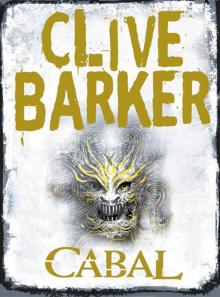 Cabal
Cabal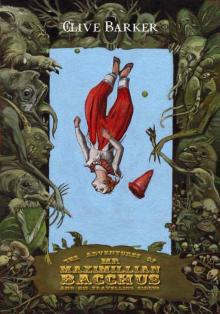 The Adventures of Mr. Maximillian Bacchus and His Travelling Circus
The Adventures of Mr. Maximillian Bacchus and His Travelling Circus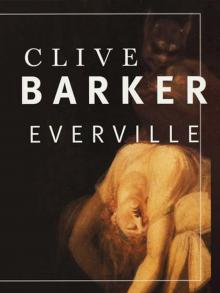 Everville
Everville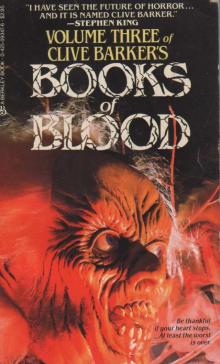 Books of Blood: Volume Three
Books of Blood: Volume Three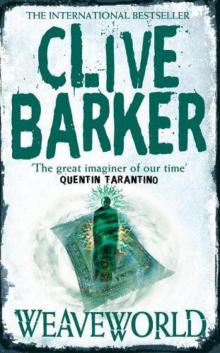 Weaveworld
Weaveworld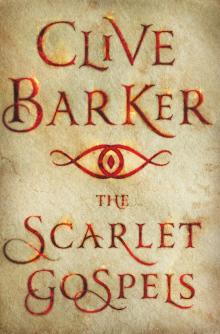 The Scarlet Gospels
The Scarlet Gospels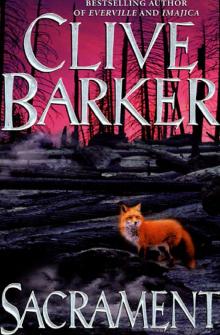 Sacrament
Sacrament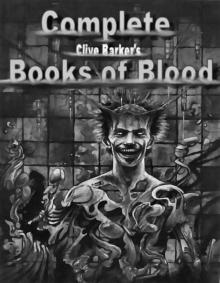 Books of Blood: Volumes 1-6
Books of Blood: Volumes 1-6 Sherlock Holmes and the Servants of Hell
Sherlock Holmes and the Servants of Hell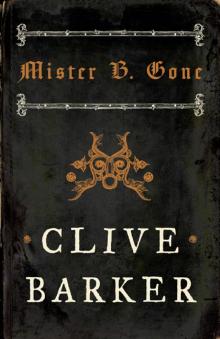 Mister B. Gone
Mister B. Gone Imajica
Imajica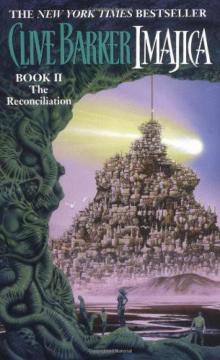 The Reconciliation
The Reconciliation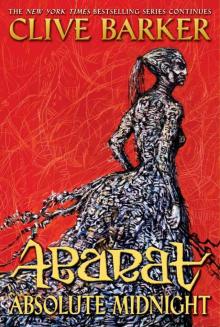 Abarat
Abarat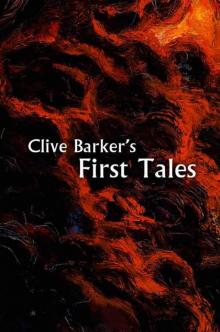 Clive Barker's First Tales
Clive Barker's First Tales The Hellbound Heart
The Hellbound Heart The Inhuman Condition
The Inhuman Condition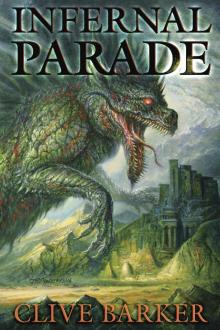 Infernal Parade
Infernal Parade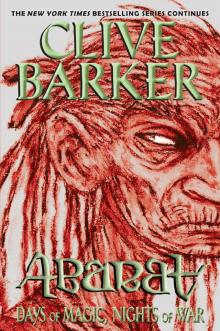 Days of Magic, Nights of War
Days of Magic, Nights of War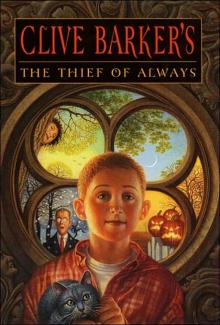 The Thief of Always
The Thief of Always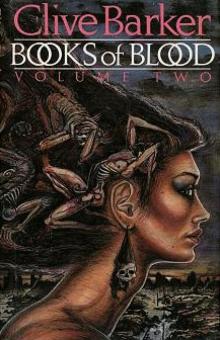 Books of Blood Vol 2
Books of Blood Vol 2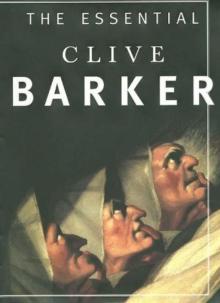 The Essential Clive Barker
The Essential Clive Barker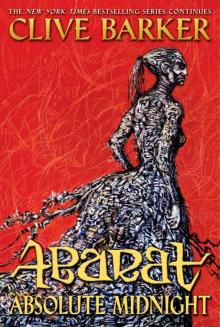 Abarat: Absolute Midnight a-3
Abarat: Absolute Midnight a-3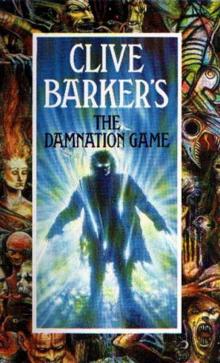 The Damnation Game
The Damnation Game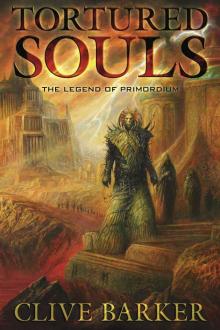 Tortured Souls: The Legend of Primordium
Tortured Souls: The Legend of Primordium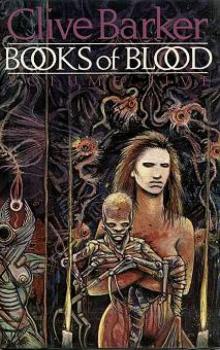 Books of Blood Vol 5
Books of Blood Vol 5 Imajica 02 - The Reconciliator
Imajica 02 - The Reconciliator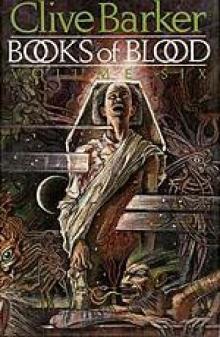 Books Of Blood Vol 6
Books Of Blood Vol 6 Imajica 01 - The Fifth Dominion
Imajica 01 - The Fifth Dominion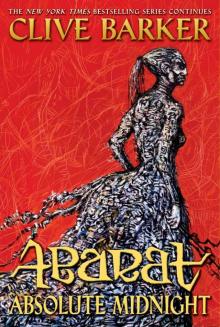 Abarat: Absolute Midnight
Abarat: Absolute Midnight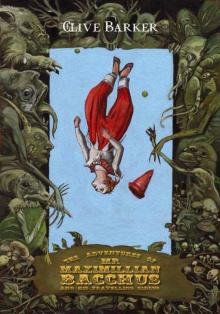 The Adventures of Mr. Maximillian Bacchus & His Traveling Circus
The Adventures of Mr. Maximillian Bacchus & His Traveling Circus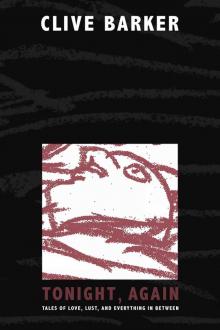 Tonight, Again
Tonight, Again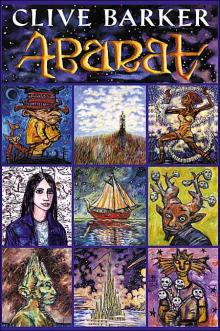 Abarat: The First Book of Hours a-1
Abarat: The First Book of Hours a-1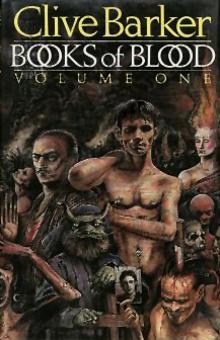 Books Of Blood Vol 1
Books Of Blood Vol 1 Age of Desire
Age of Desire Imajica: Annotated Edition
Imajica: Annotated Edition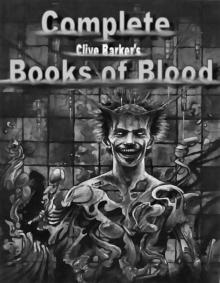 Complete Books of Blood
Complete Books of Blood Gutted: Beautiful Horror Stories
Gutted: Beautiful Horror Stories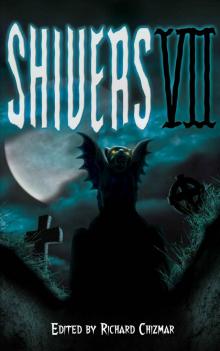 Shivers 7
Shivers 7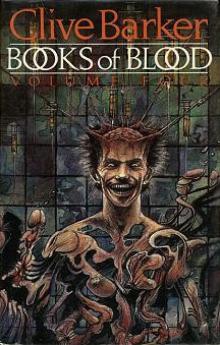 Books Of Blood Vol 4
Books Of Blood Vol 4